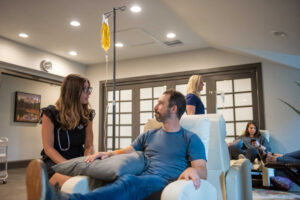As integrative medicine providers, we spend a lot of time helping our patients identify and reduce the toxins that may be silently disrupting their health.
One such emerging threat is microplastics—those tiny plastic particles less than 5 millimeters in size—that are increasingly showing up where they shouldn’t be, including inside the human brain.
A recent study by researchers at the University of New Mexico has found something both startling and urgent: for the first time, microplastics have been discovered in human brain tissue.
Even more concerning is that the brains examined contained microplastic levels up to 30 times higher than those found in other organs like the liver or kidney.
When brain samples from 2016 were compared to those from 2024, there was a 50% increase in microplastic concentration—reflecting the growing presence of plastic pollution in our environment.
Finding microplastics in brain tissue alone would be disturbing. But here’s where it becomes particularly alarming from a clinical standpoint.
Individuals who had been diagnosed with dementia were found to have the highest levels of microplastics, specifically concentrated in blood vessels and immune cells in the brain.
Interestingly, the study found that this accumulation wasn’t related to age—meaning it wasn’t just about how long a person had been alive or exposed.
Instead, it suggests a potential connection between the amount of microplastic buildup and neurodegenerative conditions.
While we don’t yet know whether microplastics directly contribute to cognitive decline, or if those with dementia are simply less able to clear these particles from their brains, what we do know is this: plastic pollution is not just an environmental issue—it’s a human health issue.
At Kare Health & Wellness, we believe that prevention starts with awareness.
Plastics are everywhere—from the water bottles we drink from, to the containers we store food in, to the air we breathe.
Reducing your exposure to microplastics is a powerful first step in protecting your long-term brain health.
Here are some practical ways we recommend limiting your microplastic exposure:
First, ditch single-use plastic water bottles and opt for glass or stainless steel.
Plastics degrade over time and especially with heat exposure, shedding microscopic particles into your drink.
Also, when it comes to storing and heating food, always use glass or ceramic containers. Heating plastics can release toxins and microplastics into your meals, even if the container is labeled “microwave-safe”.
Avoid disposable utensils, straws, and plastic-lined to-go cups whenever possible.
These items often shed particles—especially when in contact with hot foods or liquids. Bringing your own reusable cup or utensils can reduce your exposure significantly over time.
And perhaps most importantly, be mindful of packaged and processed foods. Many are stored in plastic materials that can leach contaminants.
Choosing whole, unpackaged foods as often as possible not only reduces your plastic exposure but also improves your nutritional intake—a win-win for your brain and your body.
If you’re concerned about how environmental toxins may be affecting your cognitive health or overall well-being, you’re not alone.
Our clinic specializes in identifying hidden sources of inflammation, toxin exposure, and nutritional deficiencies that may be impacting your health.
Through comprehensive testing and personalized treatment plans, we can help you reduce your toxic burden and reclaim your vitality.
At Kare, we believe your health journey should be filled with clarity, empowerment, and hope.
If you’re ready to take the next step in protecting your health from the inside out, we’re here to guide you.









